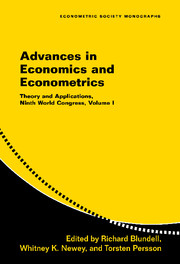Book contents
- Frontmatter
- Contents
- Contributors
- Introduction by the Editors
- Advances in Economics and Econometrics
- 1 The Economics of Social Networks
- 2 Multi-Contracting Mechanism Design
- 3 Allocative and Informational Externalities in Auctions and Related Mechanisms
- 4 The Economics of Relationships
- 5 Information in Mechanism Design
- 6 Communication in Economic Mechanisms
- 7 Advances in Dynamic Optimal Taxation
- 8 Quantitative Macroeconomic Models with Heterogeneous Agents
- 9 Modeling Inefficient Institutions
- 10 Whither Political Economy? Theories, Facts and Issues
- 11 Comments on Acemoglu and Merlo
- Index
- Titles in the series
11 - Comments on Acemoglu and Merlo
Published online by Cambridge University Press: 05 January 2013
- Frontmatter
- Contents
- Contributors
- Introduction by the Editors
- Advances in Economics and Econometrics
- 1 The Economics of Social Networks
- 2 Multi-Contracting Mechanism Design
- 3 Allocative and Informational Externalities in Auctions and Related Mechanisms
- 4 The Economics of Relationships
- 5 Information in Mechanism Design
- 6 Communication in Economic Mechanisms
- 7 Advances in Dynamic Optimal Taxation
- 8 Quantitative Macroeconomic Models with Heterogeneous Agents
- 9 Modeling Inefficient Institutions
- 10 Whither Political Economy? Theories, Facts and Issues
- 11 Comments on Acemoglu and Merlo
- Index
- Titles in the series
Summary
It is a pleasure to discuss two such rich and interesting papers. The scope of the two papers is really rather different and they complement each other well.
Antonio Merlo's paper is largely driven by inspecting the tools that we are accumulating to study issues at the intersection of politics and economics. He highlights four main areas where real progress has been made. The first is the study of voting where he discusses both the decision to vote (the determinants of turnout) and the way in which people vote (particularly whether voting is strategic). Next, he looks at politicians as a unit of analysis. He then pursues the (correct in my view) path towards studying parties as collections of citizens. Finally, he looks at legislative policy making. For the most part, he looks at theoretical issues. As we would expect in this kind of Econometric Society address, he gets into some of the modeling details.
Daron Acemoglu's paper is more focused on issues. In fact, he does not get much into the richness of political processes since he is trying to get at broader systemic questions about how politics and economics interact. A feature of his paper is the use of a unified dynamic modeling framework that can be used to illustrate a wide range of phenomena. One of the main ambitions of the paper is to look at different institutional arrangements and their implications for economic resource allocation.
- Type
- Chapter
- Information
- Advances in Economics and EconometricsTheory and Applications, Ninth World Congress, pp. 422 - 430Publisher: Cambridge University PressPrint publication year: 2006



